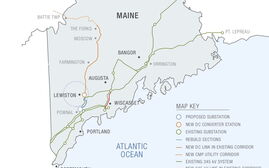In latest salvo, CMP corridor foes launch a second referendum
After an earlier referendum that might have stopped a proposed $1 billion electricity transmission line through western Maine failed to make the Election Day ballot, opponents to the plan are trying again.
Maine Secretary of State Matthew Dunlap on Friday approved the application to begin a citizens petition that could create a second referendum, this one using a different strategy to potentially block the 145-mile corridor project backed by Central Maine Power Co.
If opponents gather the required 63,067 voter signatures, the referendum could decide the fate of the long-controversial plan by asking Mainers a three-part question. Potentially on a ballot: requiring approval of the state Legislature for any high-impact electrical transmission line longer than 50 miles, prohibiting lines in the Upper Kennebec region, and confirming the need for legislative approval in projects where lines cross leased public lands.
CMP’s New England Clean Energy Connect transmission corridor would deliver 1,200 megawatts of renewable energy generated by Hydro-Quebec to Massachusetts. The project received a “certificate of public convenience and necessity” from the Maine Public Utilities Commission in April 2019.
But five months later, after gathering the necessary signatures, opponents led by the No CMP Corridor PAC petitioned for a citizens referendum requiring the PUC to revoke that approval. Despite legal attempts by CMP and corridor backers to disqualify the petition, the referendum appeared headed for a Nov. 3 vote.
But the referendum did not survive another legal challenge. In August, the Maine Supreme Judicial Court ruled that the question’s requirement was unconstitutional, since it would have called for a regulatory change, not a legislative one.
As a result, Dunlap scrapped the referendum.
Now time will tell if the new question, focused directly on action by the Legislature, ends up on a future ballot.
Tom Saviello, a former state senator and state representative who filed the application for the referendum in September, said in the release, “Despite lawsuits, sketchy tactics by CMP and scores of political and legal challenges, today we are taking this fight back to the people. We refuse to be silenced by CMP or their army of lobbyists and lawyers.”
Jon Breed, executive director of Clean Energy Matters, a group of corridor proponents, responded in a statement: “It’s not just the NECEC that is at risk here. This new referendum is so broadly written that it could jeopardize other major renewable energy projects in Maine, including solar, wind, and offshore wind projects, threatening Maine’s ability to meet our carbon reduction goals. We can’t afford to further politicize Maine’s energy needs every time we want to invest in a major renewable energy project.”














0 Comments